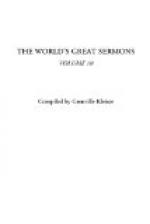and became the established doctrine of the English
Church for almost three hundred years. It was
carried across the ocean and became the dominant theory
in the New Haven school of theologians, as represented
by Jonathan Edwards, Dwight, and Taylor. The
Princeton school of theology still clung to the penal
substitution theory, and it was the clashing of the
New Haven school and the Princeton school which caused
such a commotion in the Presbyterian Church of sixty
years ago. They are antiquated. They are
too little. They seem mechanical, artificial,
trivial. We can say of the governmental theory
what Dr. Hodge said, “It degrades the work of
Christ to the level of a governmental contrivance.”
If I should attempt to preach to you the governmental
theory as it was preached by theologians fifty years
ago, you would not be interested in it There is nothing
in you that would respond to it. You would simply
say, “I do not like doctrinal preaching.”
Or if I should go back and take up the penal substitution
theory in all its nakedness and hideousness, and attempt
to give it to you as the correct interpretation of
the gospel, you would rise up in open rebellion and
say, “We will not listen to such preaching.”
If I should go back and take up the Anselmic theory
and attempt to show how an infinite debt must be paid
by infinite suffering, you would say: “Stop,
you are converting God into a Shylock, who is demanding
His pound of flesh. We prefer to think of Him
as our heavenly Father.” If I should go
further back and take up the old ransom theory of
Origen and Gregory, I suspect that some of you would
want to laugh. You could not accept an interpretation
which represents God as playing a trick upon Satan
in order to get humanity out of his grasp. No,
those theories have all been outgrown. We have
come out into larger and grander times. We have
higher conceptions of the Almighty than the ancients
ever had. We see far deeper into the Christian
revelation than Martin Luther or John Calvin ever
saw. These old interpretations are simply husks,
and men and women will not listen to the preaching
of them. If, now and then, a belated preacher
attempts to preach them, the people say, “If
that is doctrinal preaching, please give us something
practical.”
And so the Church is to-day slowly working out a new
interpretation of the great fact that Christ died
for our sins. The interpretation has not yet
been completed, and will not be for many years.
I should like this morning simply to outline in a
general way some of the more prominent features of
the new interpretation. The Holy Ghost is at
work. He is taking the things of Christ and showing
them unto us. The interpretation of the reconciliation
of the future will be superior in every point to any
of the interpretations of the past.
The new interpretation is going to be simple, straightforward,
and natural. The death of Christ is not going
to be made something artificial, mechanical, or theatrical.
It is going to be the natural conception of the outflowing
life of God.




